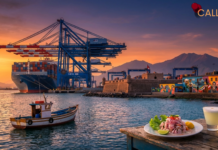
It is estimated that container trade between Japan and South Korea contracted in 2019 compared to the previous year, suffering the first year-on-year decline since 2015. Major contributing factors are believed to have been deteriorations in Tokyo-Seoul relations and delays in shipping schedules due to the six typhoons that hit the North Asian region.
The accumulated volume of containerised shipments moved on the Japan-South Korea route decreased 4% (or by some 70,000 TEU) to 1,755,934 TEU in the 11 months from January to November 2019, according to figures compiled by the Korea Nearsea Freight Conference (KNFC). As for local cargo, 344,659 TEU were exported from South Korea to Japan, down 4.3%. Meanwhile, cargo from Japan to South Korea declined 5.8% to 296,814 TEU. The combined volume of transshipment (T/S) and feeder containers also waned, falling 3.4% to 1,114,461 TEU in total.
Containers on the trade, however, improved 8.4% and 7.3% year on year in October and November, respectively, but are estimated to have fallen in December and January.
Japan tightened its restrictions on exports of high-tech materials to South Korea in July 2019. Reacting to this move South Korea boycotted Japanese products, leading to the expected contraction of the container trade between the two economies. The total value of exports from Japan to South Korea plunged 12.9% to US$29,594,892 in 2019, according to trade statistics unveiled by Japan’s Ministry of Finance on 23 January.




